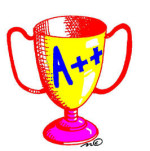POLS210 All Week Quizzes Latest 2017

- Mastermind
- Rating : 6
- Grade : A+
- Questions : 0
- Solutions : 3687
- Blog : 0
- Earned : $13683.31

Week 1 quiz
Question 1 of 10
Which concept is specifically written in the Bill of Rights?
A. separation of church and state
B. protection from offensive language
C. the right to healthcare
D. the right of the people to keep and bear arms
Question 2 of 10
What is government?
A. the way a society organizes itself and allocates authority
B. the method to control a population
C. a system of distributing goods to people
D. the ultimate authority over people
Question 3 of 10
Article 6, Clause 2 of the US Constitution is referred to as the “Supremacy Clause.” What is this?
A. It refers to the Supreme Court having final say over any law enacted by Congress.
B. It refers to Congress being the primary branch of government regarding law-making.
C. It refers to the president being the leader of the Executive Branch.
D. It refers to federal laws having precedence over any state law.
Question 4 of 10
Which statement about the balance of power between the federal and state governments is most accurate?
A. The federal government is always losing power.
B. The balance of power is the same as when the Constitution was first ratified.
C. The United States now has a national system and not a federal system.
D. It is dynamic with power sometimes leaning toward the states and sometimes towards the federal government.
Question 5 of 10
Which form of federalism consists of the federal and state governments working together on issues?
A. cooperative
B. dual
C. layer-cake
D. nationalism
Question 6 of 10
What was the name of the USA's first form of government?
A. The US Constitution
B. The Declaration of Independence
C. The Emancipation Proclamation
D. The Articles of Confederation
Question 7 of 10
Clean air, clean water, safe streets, and national security are often cited as examples of what?
A. Utopia
B. public goods
C. conflicting national priorities
D. primarily private responsibilities
Question 8 of 10
How many different and specific governments are there in the United States?
A. There's only the American government.
B. Counting states and the federal government, there are 51.
C. Including the states, the federal government, and Washington DC, there are 52.
D. Including states, cities, counties, federal, and others, there are more than 80,000.
Question 9 of 10
What system of government does the United States have?
A. liberal
B. republic
C. democracy
D. capitalism
Question 10 of 10
What does “separation of powers” mean?
A. This concept has to do with the national military Services relative to the states’ National Guards.
B. Based on the 10th Amendment, the federal government has one set of powers, and anything not specified for it in the Constitution reverts to the states.
C. This concept has to do with spreading power among three branches of government so no one branch would have unitary power.
D. This is what is causing the partisanship in Congress – having two chambers (i.e., House and Senate) with different powers.
Week 2 quiz
Question 1 of 10
What is the most practical description of the US party system?
A. proportional representation
B. multiparty
C. non-partisan
D. two-party
Question 2 of 10
What type of principle says the winner of a state or congressional election is the person who gets the most votes?
A. majority rules
B. Electoral College
C. plurality voting
D. minority voting
Question 3 of 10
What is NOT a purpose of a professional politician's campaign?
A. It's to accurately portray candidates so voters can make the best choice.
B. It's to develop and control the image of a candidate.
C. It's to portray the opposing candidate in a bad light.
D. It's to win an election.
Question 4 of 10
Which is NOT considered a legitimate form of civic engagement?
A. voting
B. terrorism
C. contacting a government official
D. volunteering
Question 5 of 10
Which type of election is used for parties to choose their candidates?
A. federal
B. runoff
C. primary
D. gubernatorial
Question 6 of 10
Which party is least likely to support government-mandated environmental regulations?
A. Green Party
B. Democratic Party
C. Libertarian Party
D. Socialist Party
Question 7 of 10
Which characteristic is NOT true of America’s political culture today?
A. greater acceptance of differences in people
B. decreasing trust in government
C. greater racial and ethnic diversity
D. increasing focus on traditional Christian values
Question 8 of 10
Which statement about voter turnout rates is true?
A. Whites are least likely to vote.
B. Voter turnout roughly the same for each election.
C. Men are twice as likely to vote as women.
D. The young have lower voting rates than the elderly.
Question 9 of 10
What's a name for any American political party other than the two major parties?
A. third party
B. majority party
C. insignificant party
D. wasted-vote party
Question 10 of 10
Which statement about the US party system is most accurate?
A. Presidents must be from either the Democratic Party or the Republican Party.
B. The Constitution never mentions political parties.
C. Parties are not concerned with winning elections.
D. Voters must declare membership in a political party to vote.
Week 3 quiz
Question 1 of 10
What is main purpose of taxes?
A. promote fairness
B. modify citizen behavior
C. provide funds to run the government
D. subsidize jobs
Question 2 of 10
What is the title of the presiding officer of the House of Representative?
A. Majority Whip
B. Majority Leader
C. Chief Justice
D. Speaker of the House
Question 3 of 10
What is the filibuster?
A. a procedure in the House to pass a proposed bill
B. a procedure that takes advantage of the Senate's open debate rules to defeat or delay a bill .
C. a procedure in the House to defeat or delay a bill
D. a procedure in conference committees to pass a bill
Question 4 of 10
Floor debate in the two chambers of Congress is most accurately described as:
A. Governed by the same rules.
B. Governed by different rules, with the House allowing for unlimited debate and the Senate having specific rules for debate.
C. Governed by no rules; anyone can speak in the order in which they sign up.
D. Governed by different rules, with the House having specific rules for debate and the Senate allowing unlimited debate.
Question 5 of 10
Over which factor in budget policy does Congress have little control?
A. actions of other countries in their trade and tax policy
B. amount of money allocated for programs
C. taxation rates
D. beginning and ending dates for programs
Question 6 of 10
What is cloture?
A. a French word meaning “guillotine”
B. a vote in the Senate to end a filibuster requiring 60 votes
C. a vote in the Senate to end a filibuster requiring 51 votes
D. a vote in the House to end a filibuster
Question 7 of 10
In the Senate, this person determines which legislation goes to the floor for consideration, oversees the legislative agenda, and is the leader with the most power.
A. The Majority Leader
B. The Minority Leader
C. president pro tempore
D. Clerk of the Senate
Question 8 of 10
How does Congress primarily affect the economy of the United States?
A. They mandate prices and wages.
B. They provide jobs.
C. They determine tax rates and fund programs.
D. They can overrule Supreme Court decisions on legislation.
Question 9 of 10
A member in the House of Representatives may serve:
A. Four year terms with no term limit.
B. Four year terms with a term limit of eight years.
C. Two year terms with a term limit of eight years.
D. Two year terms with no term limit.
Question 10 of 10
Who is the President of the Senate?
A. The Secretary of State
B. The Vice President
C. The current Chair of the Senate Ways and Means Committee
D. The Senate Majority Leader
Week 4 quiz
Question 1 of 10
Which of the following can a president do through executive order?
A. Mandate a higher wage for federal employees.
B. Require the Supreme Court to hear a case.
C. Force Congress to repeal a law.
D. Raise federal income taxes.
Question 2 of 10
Which is a power of the president to determine immigration policy?
A. Provide U.S. Immigration and Customs Enforcement with instructions and priorities for deportation of immigrants residing illegally in the U.S.
B. Ignore a federal law if the law appears unconstitutional.
C. Ban people of certain religions from applying for citizenship.
D. Pass legislative funding for a border wall.
Question 3 of 10
Which of the following is the most accurate description of how a president is chosen?
A. A national popular election chooses the president by direct vote.
B. State legislatures choose electors for the Electoral College, and then the Electoral College chooses the president.
C. States and Washington DC hold popular elections to choose electors for the Electoral College, and then the Electoral College chooses the president.
D. State governors choose electors for the Electoral College, and then the Electoral College chooses the president.
Question 4 of 10
When does the House of Representatives choose the president?
A. If no candidate gets a majority in the Electoral College.
B. If no candidate gets a majority of the national vote.
C. If a president dies in office and the vice president declines the office.
D. If the Electoral College is not in session.
Question 5 of 10
Which is NOT true about impeachment of a president?
A. Bill Clinton and Andrew Johnson are the only presidents ever impeached.
B. No president has ever been convicted by the Senate.
C. Richard Nixon was not impeached.
D. A president will be impeached for breaking campaign promises.
Question 6 of 10
Which is a military power of the president?
A. Declare war on another country.
B. Mandate the budget for the U.S. military.
C. Deploy troops in an emergency situation.
D. Push "the button" to launch nuclear weapons.
Question 7 of 10
Who was the last president to receive a and actual formal declaration of war from Congress?
A. Ronald Reagan
B. George W. Bush
C. Lyndon Johnson
D. Franklin Roosevelt
Question 8 of 10
Which NOT true of the Electoral College system?
A. States have equal say in choosing the president.
B. Larger states have greater influence in choosing a president.
C. The clout of smaller states is boosted compared to a direct election system.
D. A president can receive majority of electoral votes while receiving fewer actual citizen votes than an opponent.
Question 9 of 10
Which of the following is not a duty of the US president?
A. Determine the constitutionality of laws.
B. Appoint justices to the Supreme Court.
C. Propose a budget to Congress.
D. Enforce and execute federal laws.
Question 10 of 10
Which action is least likely to be taken by an “imperial”president?
A. Order troops without congressional authorization.
B. Defer to Congress on policy disagreements.
C. Unilaterally modify drug policy through executive order.
D. Selectively enforce policies based on personal politics.
Week 5 quiz
Question 1 of 10
The United States court system is best considered to be:
A. populist
B. presidential
C. adversarial
D. parliamentary
Question 2 of 10
Congress plays a role in the federal courts that includes:
A. Authorizing all federal courts below the Supreme Court.
B. Approving the federal courts’ budget.
C. Defining the jurisdiction of the federal courts.
D. All of the above
Question 3 of 10
Federal judges are nominated by the president and confirmed by:
A. The Supreme Court
B. The Vice President
C. The House of Representatives
D. The Senate
Question 4 of 10
Which types of cases are decided by federal courts?
A. criminal cases
B. civil cases
C. neither criminal nor civil cases
D. both criminal and civil cases
Question 5 of 10
What is the difference between civil liberties and civil rights?
A. There is no difference.
B. Liberties are more closely related to freedoms, and rights are more closely related to equal treatment.
C. Civil rights replaced civil liberties during the Civil Rights Movement.
D. Liberties are more closely related to equal treatment, and rights are more closely related to freedoms.
Question 6 of 10
The majority of legal disputes in the United States are resolved in:
A. Separate state courts in each of the 50 states
B. Trial courts by jury trial
C. United States District Courts
D. Magistrates Courts
Question 7 of 10
What is the power of courts to review the actions of government officials to determine whether they are constitutional?
A. constitutional testing
B. power of the purse
C. judicial precedent
D. judicial review
Question 8 of 10
What is the Supreme Court test for whether or not a law violate the Establishment Clause?
A. The Lemon Test
B. The Wall of Separation Test
C. The Religious Freedom Test
D. The Westboro Test
Question 9 of 10
Thousands of petitions for review are presented to the Supreme Court each year, and the Court typically accepts:
A. approximately half of the cases
B. approximately one third of the cases
C. over 1,500
D. around 100
Question 10 of 10
Which term best describes "stare decisis"?
A. precedent
B. activism
C. overturn
D. reinterpret
Week 6 quiz
Question 1 of 10
Which method of selection is used to choose civil servants?
A. merit
B. patronage
C. seniority
D. executive privilege
Question 2 of 10
Which statement about Social Security is the most accurate?
A. The program invests in primarily in stocks.
B. Americans can opt out of the program and invest independently.
C. Working Americans are part of Social Security whether they want or not, but they can still invest independently and privately in addition to Social Security.
D. The program has worked flawlessly with no additional tax increases to fund it since it started.
Question 3 of 10
What is the policy alliance called between interest groups, Congressional committees, and bureaucratic agencies?
A. iron triangle
B. unholy alliance
C. normal politics
D. crony capitalism
Question 4 of 10
Which is the oldest department in the executive branch?
A. Energy
B. State
C. Education
D. Homeland Security
Question 5 of 10
Which branch of government can affect the operation of the federal bureaucracy?
A. The judicial branch can affect it through court decisions.
B. The legislative branch can affect it through passing new laws.
C. The executive branch can affect it through executive orders and appointments from the president.
D. All three branches can affect the bureaucracy.
Question 6 of 10
What type of agency is the CIA?
A. regulatory
B. government corporation
C. shared
D. independent
Question 7 of 10
What has happened to the size of the federal bureaucracy since the ratification of the Constitution?
A. It has grown in size and scope.
B. It has shrunk in size and scope.
C. It has grown in size, but narrowed in scope.
D. It's identical to the days of George Washington.
Question 8 of 10
Which is NOT a recommendation to make the bureaucracy more responsive?
A. limiting appointments to 6-12 years
B. rotating professionals between agencies and from outside
C. making department heads elected positions.
D. making it easier to fire a bureaucrat
Question 9 of 10
The Attorney General heads which Cabinet Department?
A. Department of Defense
B. Department of Homeland Security
C. Department of Justice
D. The Attorney General is not part of the Cabinet.
Question 10 of 10
What can be learned from the USDA and FDA controversies?
A. Bureaucrats are immune from public pressure since they are not elected.
B. Bureaucracies simply implement laws as written with no room for interpretation.
C. Bureaucratic rules and regulations can have as much influence on Americans as laws passed by Congress.
D. The bureaucracy is too large.
Week 7 quiz
Question 1 of 10
Which regulatory branch of the federal government has the greatest influence on policy for the mass media?
A. Central Intelligence Agency
B. Federal Election Commission
C. Federal Communications Commission
D. Ministry of Communications
Question 2 of 10
Which statement about social and economic policy is the most accurate?
A. Social and economic policies are clearly independent of each other.
B. Being a free society, the U.S. only has economic policies and isn't involved in the social order.
C. It can be difficult to distinguish between social and economic policy, such as providing cash and food assistance to poor Americans.
D. Healthcare policy is neither a social nor an economic policy.
Question 3 of 10
Which stage of the policy process entails putting a new law into action?
A. implementation
B. formulation
C. agenda-setting
D. evaluation
Question 4 of 10
From which source of tax revenue does most federal funding come?
A. payroll taxes
B. corporate taxes
C. individual income taxes
D. excise taxes
Question 5 of 10
"Corporate welfare” is typically opposed by each of the following groups except:
A. fiscal conservatives
B. liberal Democrats
C. business executives
D. libertarians
Question 6 of 10
What is the term used to broadly categorize most policies based on their goals or the sector of society they affect?
A. analysts
B. arenas
C. makers
D. evaluators
Question 7 of 10
Which is the correct ordering of the policymaking process?
A. agenda-setting, policy formulation, implementation, evaluation
B. mobilization, action, reaction
C. policy formulation, evaluation, implementation, agenda-setting
D. crisis, accommodation, feedback, resolution, crisis
Question 8 of 10
Which policy type led to the construction of the Hoover Dam?
A. redistributive
B. distributive
C. social
D. justice
Question 9 of 10
To what does the term "public policy" refer?
A. laws passed by Congress
B. executive orders from the president
C. Supreme Court decisions
D. all governmental programs, rules, and courses of action
Question 10 of 10
What is a side effect of a policy that may be detrimental to the policy's intentions, such as lower tax revenues from a steep tax rate increase?
A. incomplete policy
B. reverse results
C. unintended consequence
D. none of the above
Week 8 quiz
Question 1 of 10
What is the status quo?
A. a populist revolt that replaces the corrupt elites
B. keeping things as is
C. lack compassion for the underprivileged members of society
D. supply side economic theory
Question 2 of 10
A movement that starts from the bottom up rather than top down is called what?
A. grassroots
B. public interest
C. direct
D. trade association
Question 3 of 10
Political action committees:
A. are usually run by liberal Democrats.
B. are the perfect example of the inherently evil nature of the American political system.
C. are usually dominated by wealthy white males.
D. make donations to political campaigns.
Question 4 of 10
What is money that interests can spend on behalf of candidates without being restricted by federal law?
A. bribes
B. hard money
C. none of the above
D. soft money
Question 5 of 10
The formation of an interest group in response to a perceived need is known as:
A. pluralism
B. corporatism
C. the logic of collective action
D. disturbance theory
Question 6 of 10
Political action committees are most likely to donate to:
A. Democratic incumbents.
B. state party organizations.
C. Republican challengers.
D. incumbents of both major political parties.
Question 7 of 10
Which group theory claims that groups form in opposition to other groups?
A. disturbance theory
B. logic of collective action
C. democratic theory
D. pluralism
Question 8 of 10
If an individual benefits from the activities of an organization but does not contribute to the organization, it is known as:
A. an interest group entrepreneur.
B. systemic bias.
C. the free rider problem.
D. personal lobbying.
Question 9 of 10
Which concept assumes that elections determine who
governs and what policies will be enacted into law?
A. Marxism
B. direct representation theory
C. democratic theory
D. none of the above
Question 10 of 10
Which of the following can be said about interest groups?
A. They can be beneficial.
B. They can be detrimental.
C. Neither A nor B
D. Both A and B
[Solved] POLS210 All Week Quizzes Latest 2017
- This solution is not purchased yet.
- Submitted On 27 Jan, 2018 03:32:23

- Mastermind
- Rating : 6
- Grade : A+
- Questions : 0
- Solutions : 3687
- Blog : 0
- Earned : $13683.31


POLS210 All Week Quizzes Latest 2017

POLS210 All Week Quiz 2017 (Week 1, 2, 3, 4, 5, 6)
The benefits of buying study notes from CourseMerits

Assurance Of Timely Delivery
We value your patience, and to ensure you always receive your homework help within the promised time, our dedicated team of tutors begins their work as soon as the request arrives.
Best Price In The Market
All the services that are available on our page cost only a nominal amount of money. In fact, the prices are lower than the industry standards. You can always expect value for money from us.


